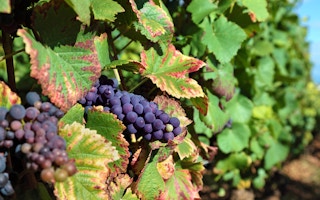Global warming has begun to change the conditions for a fine wine harvest. The grapes are blooming earlier in Burgundy. The vintners of Vaud in Switzerland have a new harvest timetable. And the conditions for fine claret have altered in Bordeaux.
Two US scientists have analysed 400 years of harvest data from France and Switzerland to confirm that, while climate change has not yet created problems for wine-lovers, it has certainly altered the expectations of a harvest.
Whereas growers could once exult in wetter-than-usual springs and a dry summer to bring their grapes to the highest quality, now they don’t need a late drought. Higher temperatures mean they can harvest earlier, even if the seasons have been moister.
“Harvest dates are getting much earlier, and all the evidence points to it being linked to climate change,” said Elizabeth Wolkovich, a biologist at Harvard University. “Especially since 1980, when we see a major turning point for temperatures in the northern hemisphere, we see harvest dates across France getting earlier and earlier.”
She and her co-author Ben Cook, of the US space agency Nasa and the Lamont-Doherty Earth Observatory at Columbia University in New York, report in Nature Climate Change that they pored over harvest records and tree ring measurements dating back to 1600, and vintage statistics and instrument measurements throughout the 20th century.
Uncertain prospects
Warmer temperatures tend to accelerate wine grape maturation; increased rainfall tends to delay it. High-quality French wines are typically associated with early harvest dates. From 1600 to 1980, the earlier harvests happened after a late season drought. Thereafter, the good years delivered earlier harvests even without the drought. But the good times may not last.
“The bad news is that if we keep warming the globe, we will reach a tipping point. The trend in general is that earlier harvests lead to high-quality wine, but you can connect the dots here,” Dr Wolkovich said.
“We have several data points that tell us that there is a threshold we will probably cross in the future where higher temperatures will not produce higher quality.”
Harvests are now up to two weeks earlier than the average for the period 1600-1980. Growers have been keeping harvest records for up to 700 years, but methodical tallies and inventories across France and Switzerland date from 1600, and they tell a tale of change.
Harvests from Bordeaux and Burgundy have been rated for quality for more than a century, and this too helped the researchers answer some of the key questions.
“Wine grapes are one of the world’s most valuable horticultural crops and there is increasing evidence that climate change has caused earlier harvest days in this region in recent decades,” said Dr Cook. “Our research suggests that the climate drivers of these early harvests have changed.”
For every 1°C of warming, harvests have been pushed forward by six or seven days. While change in average temperature, ultimately driven by greenhouse gas emissions from the combustion worldwide of fossil fuels, cannot answer questions about the quality produced by individual vineyards, or even specific wine regions, it suggests that conditions are changing, and with it the pressures on the industry.
Liz Thach, a professor of management and wine business at Sonoma State University in California, said the study told growers what they already knew.
“Some people may still be sceptical about global warming, but not anyone in the wine industry,” she said. “Everyone believes it, because everyone sees it year by year—it’s here, it’s real, it’s not going away.”

















